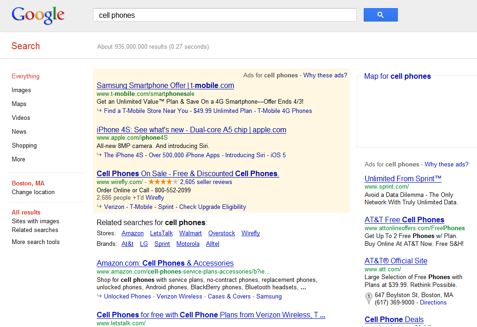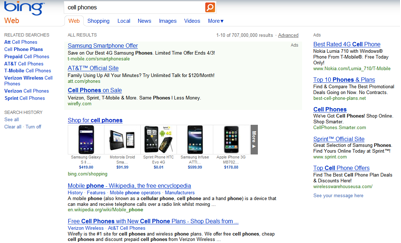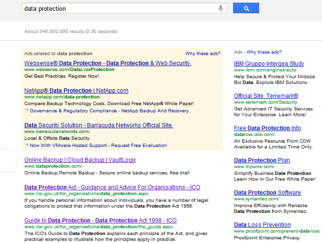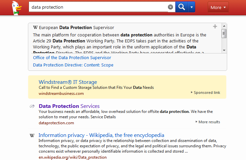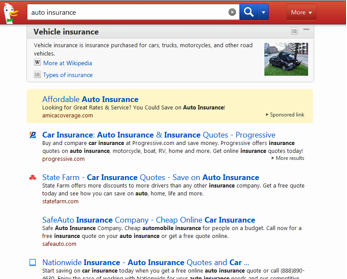DuckDuckGo may seem like a simple search service with a cartoon duck, but it’s actually shaping up to be a user-friendly, privacy-focused search engine that is gaining ground. On May 9, 2012, it fielded more than 1.5 million queries. Check out this chart of its search volume growth (courtesy of DuckDuckGo):
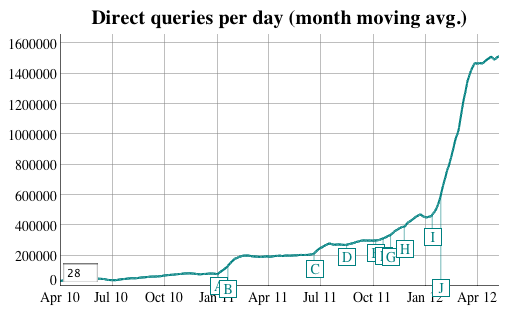 I know what you’re thinking: “Google is the only search engine that really matters.” Well, maybe not. Sixty-one percent of consumers were so concerned about Google’s privacy updates that they were considering closing related accounts. Another 45 percent are not fans of Search Plus Your World because they don’t want tracked social data to influence their SERPs. And now, search runner-up Bing has integrated more social data into search results. Although Microsoft attempts to keep these social results separate from standard web results, the update might make it a less appealing alternate for those trying to break away from Google.
I know what you’re thinking: “Google is the only search engine that really matters.” Well, maybe not. Sixty-one percent of consumers were so concerned about Google’s privacy updates that they were considering closing related accounts. Another 45 percent are not fans of Search Plus Your World because they don’t want tracked social data to influence their SERPs. And now, search runner-up Bing has integrated more social data into search results. Although Microsoft attempts to keep these social results separate from standard web results, the update might make it a less appealing alternate for those trying to break away from Google.
Nonetheless, privacy woes and social overload haven’t stopped Google from dominating as the No.1 search engine (and it’s likely to retain its spot as users’ preferred search service for the foreseeable future). But SEO marketers should still be thinking about other discovery channels. If nothing else, this is critical because cheap attempts to optimize sites (and website content) for Google are quickly being targeted by the company’s new webspam algorithm updates. Plus, as Brafton has reported in the past, moving beyond Google dependency is deemed a top strategy for Panda-proofing a website. Any way you think about it, focusing on the user is now essential to Google visibility AND overall web visibility.
One way to make sure you’re not getting hooked on magic bullets for Google is by taking a closer look at other rising networks on the web to consider what users value on these channels. Social discovery is huge, which has made social marketing a popular approach to visibility – and relative newcomers like Pinterest and Pinerly are making waves. But marketers should also think about the potential of alternate search portals, and DuckDuckGo is one to watch.
When founder Gabriel Weinberg came up with the idea for a hybrid search engine, he wanted to provide people with less ads, more user-friendly gadgets and quality results. The result is a search experience based on what users want – and that’s increasingly privacy. Over the past year, DuckDuckGo has gained minimal traction. But now that privacy policies of tech giants (like Google!) are being called into question, a particular road has been paved for potential DuckDuckGo growth.
Let’s take a closer look at how DuckDuckGo works and why your online audiences might love it.
DDG puts privacy first
DuckDuckGo is a search engine that enables you to complete normal searches with complete privacy by not using cookies or collecting any information about what you are searching for. On the other hand, Google’s April search updates indicate it’s focusing even more on users’ previous queries to interpret searches and provide contextual results, and Brafton has reported that Bing uses Adaptive Search to remember what people might prefer based on previous queries.)
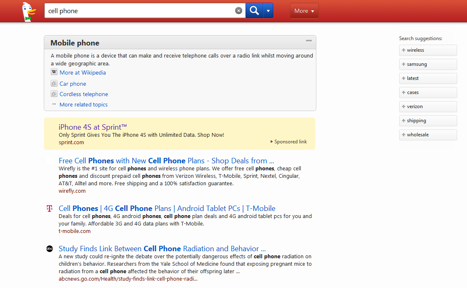
By never leaving behind a trail, I’m able to view results on DDG that are not based on what the search engine thinks I might be interested in, but rather what is most relevant to the particular query I input. There are advantages to having cookies as well as disadvantages, but the search on DuckDuckGo gives me more variety in the results than I might see on Google or Bing because it isn’t considering my history. From an SEO perspective, this means pervious site visits won’t necessarily help users find your site in search results… but it also means discovery among new potential site visitors is heightened.
When I did a search for “cell phones,” I got much different results on DDG than Bing or Google. Searches on Bing and Google presented tailored ads and sites I’ve visited before based on my searches for phones in the past. The DuckDuckGo searches give me information I might not have found otherwise.
More answers = less work for users
One thing search marketers might have mixed feelings about with DDG is that it doesn’t always encourage people to click on results… Instead it tries to give users more answers straight on SERPs. For instance, when I search for data protection on DDG, I get a paragraph description of what it on top of the results. There’s not necessarily a need for me to click a result if I’m looking for information about what this is. Meanwhile, the Google results for the same query require me to click to learn… and incidentally, the top results sites where I might also be able to buy related products.
Of course, depending on the type of query I input, this is something Brafton has reported Google is working on as well. For instance, here’s a screen shot of my search for the Red Sox schedule. DDG gives me a list of the upcoming games. So does Google – and Google lets me buy tickets from the sites it sponsors directly on the SERP (which might be bad news for other companies selling Red Sox tickets that aren’t highlighted next to the schedule Google provides…).
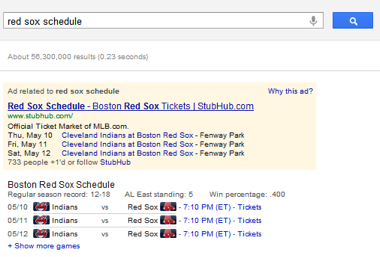
 DDG SEO benefit: Organic answers have more room to shine
DDG SEO benefit: Organic answers have more room to shine
One thing I really like about DDG from a user perspective – and something marketers investing more in SEO than paid search might also like – is that there aren’t many ads cluttering the results.
Check out the difference between these two searches for auto insurance. Both capture what I found above the fold. The DDG results feature four organic listings before I have to scroll down, whereas Google only displays two results because of all the space devoted to ads.
At the end of the day, SEO marketers can’t ignore the drawing power of Google, which now accounts for 66.5 percent of all search activity. Still, privacy is a ever-growing concern on the web more and more people are aware of what data is being taken (or not being taken in the case of DDG). Brafton has reported there’s a movement among consumers to break out of the Google bubble when it comes to search filters and new discovery. (Similarly, marketers have to break their Google dependence if they want to do well in SEO – even on Google’s own site, where they have to focus on the user!)
A person’s ability to choose what information is given out and where it ends up might be the key to the next rising star in search – and this tenet is the backbone of DuckDuckGo.

